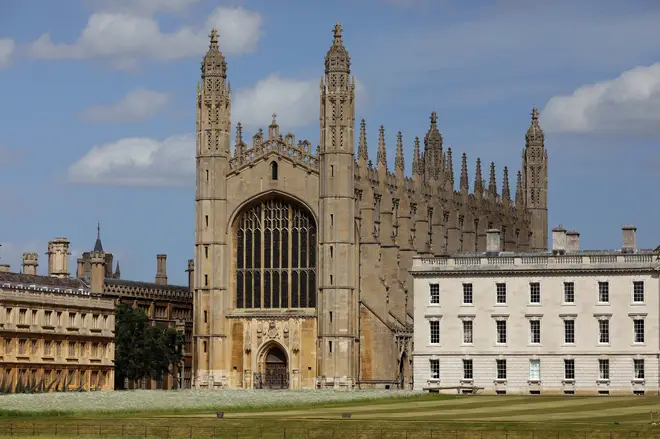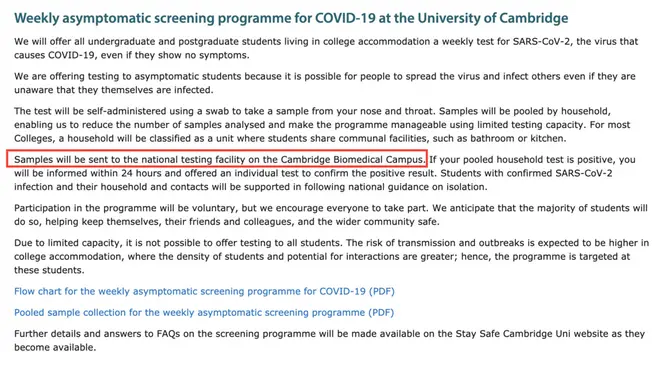
Richard Spurr 1am - 4am
9 September 2020, 15:41 | Updated: 9 September 2020, 15:45

Cambridge University has announced plans to offer around 15,000 students weekly coronavirus tests, raising concerns that it could eat into the UK's national testing capacity.
The announcement comes just hours after Health Secretary Matt Hancock suggested that people without symptoms were responsible for Covid test shortages and told LBC he wanted “those tests to be available for people with symptoms”.
In a message to all students on Wednesday, Professor Patrick Maxwell, Head of the University’s School of Clinical Medicine said: “We will offer all undergraduate and postgraduate students living in college accommodation a weekly test for SARS-CoV-2, the virus that causes COVID-19, even if they show no symptoms.
“We are offering testing to asymptomatic students because it is possible for people to spread the virus and infect others even if they are unaware that they themselves are infected.
“Participation in the programme will be voluntary, but we encourage everyone to take part. We anticipate that the majority of students will do so”.
Professor Stephen J Toope, Vice-Chancellor of the University, said: “We look forward to welcoming our students back to Cambridge and want to reassure them – and the wider local community – that we are doing everything we can to make sure they feel safe and supported while they are here."

The self-administered tests will be pooled in groups of households to reduce the number of samples analysed, but the plans will still raise concerns that an already stretched national testing system will be used on students without symptoms.
On Tuesday, the Director of Testing at NHS Test and Trace, Sarah-Jane Marsh, said “laboratory processing is the critical pinch-point” and that her team is “working 18 hours a day, 7 days a week” to increase the availability of tests.
The university initially said that “samples will be sent to the national testing facility on the Cambridge Biomedical Campus”, although this line was removed from its website after it was contacted by LBC.
In a statement to LBC, a spokesperson said: “The university has dedicated testing capacity at the facility, which will be handling the samples. However, this is subject to there being capacity for national testing.”
The Department for Health has been contacted for comment.
Speaking to Nick Ferrari on LBC this morning, vaccines expert Professor Gordon Dougon, from Cambridge, hinted at the university’s plans: “We have brought in, in the university, a sort of track and trace system of our own... we’re trying to bring a sort of local emphasis on this kind of control.”
Cambridge Student Union welcomed the measures, telling LBC the plans were “in part a result of the SU pushing for mass testing many weeks before the proposal was formulated.”
However, it called for the university to expand the program to include, “the over 6000 students living outside university accommodation, as well as academic and non-academic staff will not be covered in this program”.
Cambridge’s efforts come as concerns grow about university students returning to campus in the next month and spreading the virus.
Other universities have announced they will be testing asymptomatic students, but none have so far committed to mass weekly tests.
On Monday, the University of East Anglia said they would be offering tests to all students and staff at the start of term, while the University of Leicester said details of their plans are being finalised.
The University and College Union has warned the government is “encouraging a public health crisis”.
UCU general secretary Jo Grady said the mass movement "could lead to universities being the care homes of any second wave of Covid".
Speaking on LBC’s Call the Cabinet on Monday, Health Secretary Matt Hancock said the rise in cases across the UK was primarily among more affluent younger people who were not following social distancing rules.
"We are seeing problems with social distancing. The rise in cases is largely among younger people, under 25s, especially between 17 and 21,” he said, as cases reached almost 3,000 per day over the weekend.
Listen & subscribe: Global Player | Apple Podcasts | Google Podcasts | Spotify